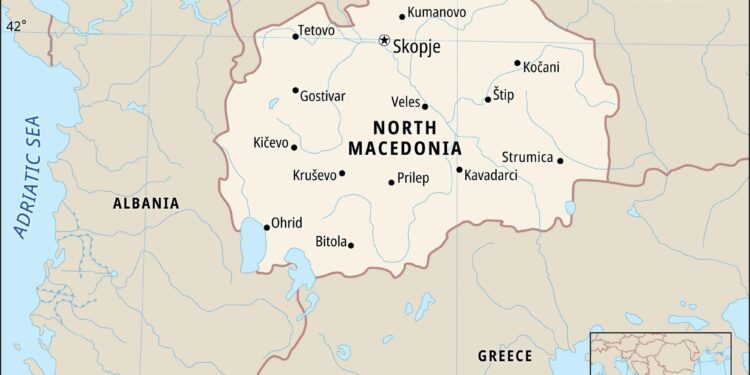The recently announced agreement between North Macedonia and the United Kingdom to establish migrant processing hubs has ignited a wave of concern across the Balkans and beyond. While the deal aims to curb irregular migration flows into the UK by relocating asylum procedures to North Macedonia, critics warn it could transform the country into a permanent hotspot for migrant detention, straining local resources and raising human rights questions. This development marks a significant shift in European migration management strategies, prompting debates over sovereignty, ethics, and regional cooperation.
North Macedonia UK Deal Raises Alarm Over Regional Migrant Processing Centers
The recent agreement between North Macedonia and the United Kingdom has sparked intense debate across the Balkans, as critics warn that the small Balkan nation could become a central node in a controversial network of migrant processing centers. Human rights organizations and regional observers express fears that this could lead to strained local resources and potentially hazardous conditions for asylum seekers. Concerns also extend to the broader geopolitical implications, with worries about North Macedonia shouldering disproportionate responsibility while the UK externalizes its migration challenges.
Key issues highlighted by experts include:
- Insufficient infrastructure to ensure humane and safe accommodation for incoming migrants.
- Potential for increased regional instability as neighboring countries react to the new migrant flows.
- Legal ambiguities regarding the rights and protections afforded to individuals processed under this deal.
| Aspect | Concern | Potential Outcome |
|---|---|---|
| Infrastructure | Limited capacity and resources | Overcrowding and deteriorating conditions |
| Regional Relations | Unequal burden-sharing | Political tensions among Balkan states |
| Legal Framework | Ambiguous asylum process | Rights violations and legal disputes |
Local Communities Express Fears Amid Plans for Increased Migrant Influx
Residents in North Macedonian border towns have voiced mounting unease regarding recent agreements with the UK aimed at increasing the number of migrants housed in the country. Many locals fear that the establishment of migrant hubs will strain already limited resources, exacerbate unemployment, and alter the social fabric of tight-knit communities. Concerns have also been raised about the sufficiency of healthcare, education, and public safety infrastructure to accommodate a sudden population increase, leading to protests and calls for transparent dialogue from policymakers.
Key community concerns include:
- Insufficient housing and risk of overcrowding
- Potential rise in crime rates and public safety issues
- Pressure on local health services and schools
- Lack of clear integration programs for migrants
- Economic impact on local job markets
| Community | Current Population | Projected Migrant Influx | Primary Concerns |
|---|---|---|---|
| Tetovo | 52,000 | 3,000+ | Housing shortage, unemployment |
| Kumanovo | 105,000 | 5,000+ | Public safety, health services |
| Gostivar | 70,000 | 2,500+ | Education, cultural integration |
Experts Call for Transparent Policies and Enhanced Humanitarian Support
Human rights advocates and migration experts have voiced serious concerns about the lack of clarity surrounding the deal between North Macedonia and the UK to establish migrant processing centers. They emphasize the urgent need for transparent policies that clearly outline legal frameworks, detainees’ rights, and procedural safeguards. Without such transparency, experts warn that vulnerable populations may face violations of international protections, and public trust in both governments could deteriorate rapidly. Calls have also been made for comprehensive monitoring mechanisms to oversee the treatment of migrants and ensure accountability at every stage.
Alongside policy clarity, the humanitarian community stresses the importance of amplified support on the ground. This includes:
- Improved access to medical and psychological care
- Provision of adequate shelter and nutrition
- Legal aid and language services to facilitate communication
- Coordination with international organizations for resource mobilization
Many experts argue that any attempt to operationalize migrant hubs must be coupled with a robust humanitarian strategy to prevent further crises. A comparative overview of key recommendations is outlined below:
| Area | Recommended Actions | Expected Impact |
|---|---|---|
| Policy Transparency | Publication of clear guidelines and legal standards | Enhanced public trust and legal compliance |
| Humanitarian Aid | Increased funding and integrated service delivery | Improved migrant welfare and protection |
| Monitoring & Accountability | Independent oversight bodies and regular reporting | Reduced rights violations and operational transparency |
Wrapping Up
As the North Macedonia-UK deal moves forward, concerns persist among local communities and human rights organizations about the impact of hosting migrant processing hubs in the Balkans. While the agreement aims to manage migration flows more effectively, critics warn that it may shift the burden onto vulnerable countries with limited resources, raising questions about transparency, accountability, and the protection of migrants’ rights. The coming months will be crucial in determining how this partnership unfolds and what it means for the future of migration management in the region.
















